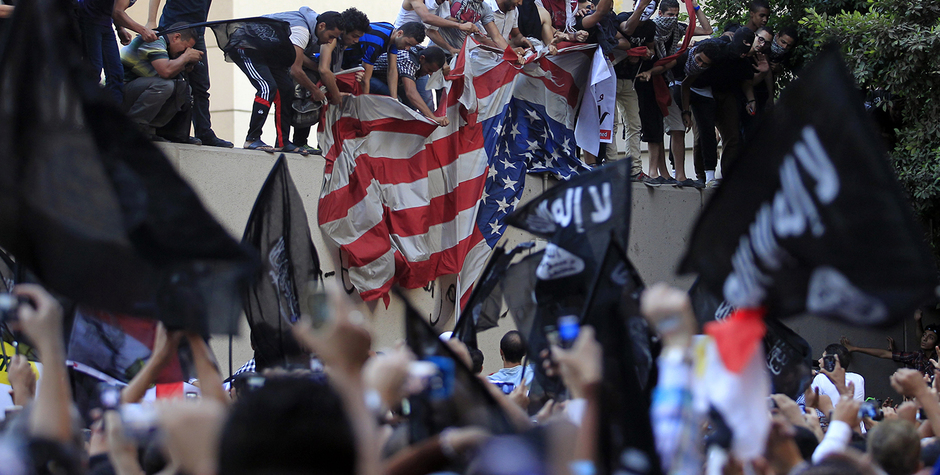How Our Enemies Work Together to Challenge the United States
As the United States commemorates the 15th Anniversary of the attacks of 9-11, the nation faces one of the most dangerous and complicated military/geo-political situations in recent history. The threat against United States’ global interests around the world, the safety of our troops abroad and of our citizens at home, is very real. These threats include the fact that China continues to ignore accepted international boundaries in the Pacific realm and North Korea persists in perfecting its capability of delivering long-range ballistic missiles, a move that is reinforced by its recent test of a nuclear device.
These threats are complicated by the fact that Iraq, Iran and Russia have proved to be unpredictable and unreliable allies in the fight to defeat ISIS. While Iran, Russia and Syria have launched small and limited air attacks against ISIS, most of their bombs and rockets have fallen on Syrian Democratic Forces (SDF) that oppose Syria’s President Assad; the SDF is a rebel group trained and supported by the United States. As the civilian casualties mount in Syria, Assad continues to use chemical weapons against his own people. Just before a recently brokered cease-fire, Syrian forces, trying to inflict as much damage as possible, attacked Aleppo again. Over 200 people have been wounded and 70 killed in a 36-hour period. Yet the Obama Administration continues to stand by their claim that Iran and Russia are our chief allies in our goal of defeating ISIS.
Complicating things further, yesterday Iran threatened to shoot down two U.S. aircraft flying in international airspace unless they changed course. The two American planes ignored the warning and did not alter their course. Iran’s Revolutionary Guard gunboats continue their harassment of U.S. Navy vessels in international waters. One incident involved seven Iranian gunboats swarming the USS Firebolt in the Straits of Hormuz. This incident required the U.S. Captain to take extreme evasive maneuvers. Either seeking to provoke or humiliate the U. S., this was the third such incident within one week. Meanwhile, in international airspace, a Russian SU-24 Fighter Jet recently circled a U.S. P-8 Poseidon plane at a distance of just 10 feet as part of a dangerous high altitude maneuver that continued for 20 minutes.
These hostile and illegal acts in the air and on the sea are not only unprofessional, they are dangerous. We are possibly one event away from a major international incident and the loss of lives. The behavior of Iran and Russia is reckless.
At the same time, Russia has amassed more than 100,000 Russian troops along its border with Ukraine. Experts believe that a Russian invasion of Ukraine is a distinct possibility in the coming weeks.
These events, taken together, give rise to a question: What is going on? In combination with Iran harassing our ships and threatening to shoot down U.S. planes, the Russian Air Force harassing our planes, and the buildup of Russian troops along the Ukrainian border, the evidence points to intentional collaboration between Iran and Russia designed to humiliate the United States. However, their purpose is not only to humiliate U.S. forces in the region. These events also serve to create a “strategic distraction” in order to overwhelm U.S. Intelligence and military assets in the region and to test the political resolve of the Obama Administration. Our enemies believe that the Administration lacks the will to forcibly respond. This belief is grounded in experience as the Obama Administration has reacted timidly to provocations in the past. America’s opponents are counting on the Administration to react very predictably: to verbally protest while asking Iran and Russia to be our friends. They are not our friends.
Our nation’s adversaries are known opportunists. When they see weakness, they exploit it. If they sense uncertainty, they capitalize on it. For example, during the presidential transition of 2008, Russia used that time to invade the Republic of Georgia. They calculated that they could do this with impunity. And they were right.
In addition, American weakness in responding to threats serves to further blunt our global fight against radical Islamic jihadists. Perhaps that is the most alarming aspect of these events. In addition to dealing with our questionable allies such as Iran and Russia, we face jihadists that are intent upon attacking us at every opportunity and in every part of the world. Their goal is nothing less than to demoralize and defeat Western Civilization. Until the United States resumes its role as an international leader and determines that our nation cannot defeat ISIS with its current policy, and our nation cannot respond to provocation with vacillation, the global climate of fear and uncertainty will remain unchecked.
Times like these demand strong leadership and an unapologetic determination that the present threats to American influence and leadership will not stand. In order to respond to these threats, our nation must summon the will to confront evil without flinching and the willingness to rally the forces of justice and peace in order to defeat evil. This is crucial. The weeks between now and the inauguration of the next President of the United States present an opportunity for our enemies. During this time period, we must be vigilant and prepared to face new challenges to peace and new threats to our safety.
To learn more about this unholy alliance threatening the United States and freedom around the world, pre-order #1 New York Times ACLJ Chief Counsel Jay Sekulow’s latest book, “Unholy Alliance: The Agenda Iran, Russia, and Jihadists Share for Conquering the World.”
